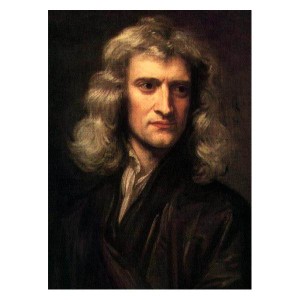Newton, Isaac
Isaac Newton (1643-1727) was an astronomer, mathematician, philosopher and theologian (he is generally considered to have been an Arian Christian, opposing the doctrine of the Trinity). He also proposed that Armageddon will come in 2060(c)(l),>and “that the world would ‘reset’ in 2060, when “the Kingdom of God” would prevail on the Earth”,<which is something of a relief for me as I would have to be celebrating my one hundred and seventeenth birthday that year. However, another claim(e) is that he favoured September 23rd 2015 for the ‘Second Coming’ of Christ. Oops, I missed that!
>Predicting the end of the world and the return of Jesus to Earth, has been a popular, but fruitless, hobby for the past two thousand years(m).<
He wrote a number of important works including The Chronology of Ancient Kingdoms Amended[1101], which was published in 1728. In it, he discussed a range of mythological links to Atlantis, including a possible connection with Homer’s Ogygia.
In a paper(j) by John Chambers in Atlantis Rising #53, he quotes a few paragraphs from Newton’s The Original of Monarchies(k) that relate to Atlantis. It is interesting that Newton considered the size of Atlantis as well as the 9,000 years since the war with Atlantis given by the Egyptian priests to Solon to be complete exaggerations. Instead, Newton proposed a period of 400 years since the war, without any justification for his figure.
Newton’s interest in the subject of Atlantis was such that he ordered a copy of Olof Rudbeck’s multi-volume Atlantica.
A paper on the exaggerated antiquity presented by ancient writers was published some years ago by the Society for Interdisciplinary Studies (SIS). In it, Newton’s revisionism is extensively discussed(h).
Wikipedia refers to Newton’s belief in Atlantis as follows: Found within “The Chronology of Ancient Kingdoms”, are several passages that directly mention the mythical land of Atlantis. The first such passage is part of his Short Chronical which indicates his belief that Homer’s Ulysses left the island of Ogygia in 896 BC. In Greek Mythology, Ogygia was home to Calypso, the daughter of Atlas (after whom Atlantis was named). Some scholars have suggested that Ogygia and Atlantis are locationally connected, or possibly the same island. From his writings, it appears Newton may have shared this belief. Newton also lists Cadis or Cales as possible candidates for Ogygia, though he does not cite his reasons for believing so. Within the same material Newton mentions that according to ancient sources, Atlantis had been as big as all Europe, Africa and Asia, but was sunk into the Sea.
Newton may have been the first in his Principia Mathematica* of 1687 to suggest the idea of polar wandering. He was also arguably the first to develop calculus as well as produce ground-breaking work on optics, however, he also had his failures, such as spending twenty fruitless years experimenting with alchemy(d). Although Newton and Gottfried Leibnitz (1646-1716) are generally credited with discovering ‘infinite series’, one of the basic components of calculus, it has now been shown that they were predated by Indian mathematicians in Kerala around 1350 AD(f).
According to his biographer, Col. R. de Villamil, Newton lived in an ‘atmosphere of crimson’ having furniture and furnishings adorned with his favourite colour.
In 2020, some notes of Newton’s, from the 1680s, were auctioned, which revealed Newton’s interest in the pyramids. It seems that “Newton was trying to uncover the unit of measurement used by those constructing the pyramids. He thought it was likely that the ancient Egyptians had been able to measure the Earth and that, by unlocking the cubit of the Great Pyramid, he too would be able to measure the circumference of the Earth.” (i)
*A copy of which was sold at Christie’s in December 2016 for a record $3.7 million.
(a) http://www.gutenberg.org/ebooks/15784 (full text)
(b) https://web.archive.org/web/20190122005200/http://www.atlantisbolivia.org/isaacnewtonatlantis.htm
(c) http://www.openculture.com/2015/10/in-1704-isaac-newton-predicts-the-world-will-end-in-2060.html
(d) https://www.youtube.com/watch?v=fuS8ebbryPc
(e) http://www.wnd.com/2015/08/did-isaac-newton-predict-major-turn-in-bible-prophecy/
(f) http://phys.org/news/2007-08-indians-predated-newton-discovery-years.html
(g) http://www.livescience.com/57229-isaac-newton-book-sold-breaks-record.html
(i) Revealed: Isaac Newton’s attempts to unlock secret code of pyramids | Isaac Newton | The Guardian
(j) Atlantis Rising magazine #53 At – PDF Archive
(k) https://www.newtonproject.ox.ac.uk/view/texts/diplomatic/THEM00142 Two thirds down the page
(l) https://nypost.com/2018/09/01/isaac-newton-predicted-the-world-will-end-in-2060/ *
(m) List of dates predicted for apocalyptic events – Wikipedia *

